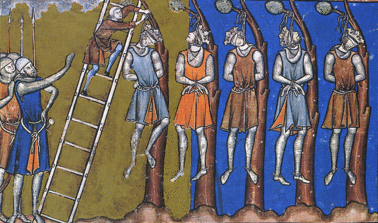
PUNISHMENT

PUNISHMENTS
Imprisonment was extremely rare. Punishments were supposed to fit the crime that the offender committed. For instance:
-
A woman found guilty of gossiping about her husband would have to wear the scold's bridle
-
A baker who cheated on a customer would be dragged through the streets with a loaf of bread around their necK
-
A peasant who was caught stealing something from the Lord would either have to pay a fine or do extra work
Punishments for minor crimes mainly consisted of public humiliation. For example:
1. Putting someone in the pillory or the stocks, where passerbys could throw food or rubbish at the offender
Other punishments are much harsher, for example:
-
Public whipping
-
Some form of mutilation, such as cutting off a hand, an ear, the tongue, etc.
IMPRISONMENT
Imprisonment was not very common in the Middle Ages as the Law often thought that imprisoning a poor person whose work might be essential to his family's survival wasn't fair.
Imprisonment was mainly used for prisoners of war who was waiting for someone to pay the ranson for their release.
BURNING
Burning is the punishment for witchcraft. This is because people believed that burning the 'witch' would cleanse her soul.
EXECUTION
Execution is usually the punishment for treason. The execution usually happens in a public area.


THE CITIZEN POLICING STYLES
The Hue & Cry:
If you saw someone stealing you had to shout, “Stop, thief!’ and chase after the person. Others would join the chase.
The Tything:
All males over the age of 12 belong to a group called a Tything. Each tything leader watched the behavior of each person in his group.
The Constable:
Citizens chose a constable to keep order in daylight hours. This job was extremely unpopular, especially with the nobles, as it is unpaid.
The Watch:
After dark, men take turns being in the watch to keep order at night. This was also very unpopular with the nobles, as it is also unpaid.
TRIAL BY ORDEAL
Order by Fire:
Suspect held a heated iron bar and walked three paces. If he burn healed within three days, they were innocent
Order by Boiling Water:
A suspect’s hand was plunged into boiling water. If the scald healed in three days they were innocent


